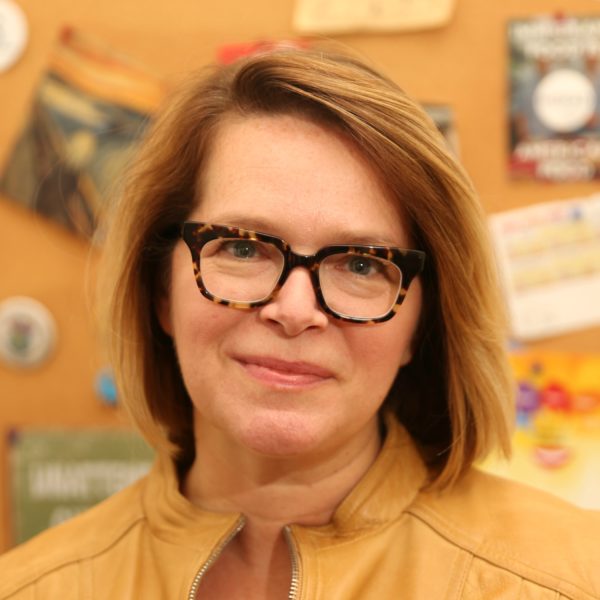Advertisement
Commentary
Choosing To Be Childfree

If you’d asked 11-year-old me what I wanted to be when I grew up, I would have told you a mom. A Cool Mom. I’d have my first child — a boy — at 20; my second — a girl, of course — at 22. Cool Mom Amy picked her kids up from school every day, in all her Cool-Mom glory — big hair, neon miniskirt, legwarmers — with Capri Suns at the ready. She was the go-to chaperone at school dances and field trips, where kids soaked up her advice on fashion and friendships. Cool Mom Amy had a career, too. She was a musician, performing around the world. And she wasn’t just cool, she was fashionable and talented and sophisticated, too.
It all seemed reasonable enough. It was the ‘80s. Women were “having it all” all over the place. Why not me?
It didn’t occur to me that my globe-trotting lifestyle might not align well with chaperoning every school event, particularly in the age of intensive parenting. Or that I might be doing this alone, without a partner. Or if I had one, they might not be down for taking on the lion’s share of work needed to run a household while I traveled the world.
Could I have achieved the dream of world travel for work and Cool Mom parenting? Perhaps, but without incredible wealth, it seems unlikely. As Princeton professor Anne-Marie Slaughter put it in her 2012 critique of the myth that women really could have it all, the idea is only really attainable for the “superhuman, rich, or self-employed.”
At the time, I also hadn’t considered that I might grow up not wanting to be a mom or that non-motherhood was an option anyone could choose.
As I write in my book, “Childfree by Choice,” not having kids may be nothing new, but the notion that opting out of parenthood — for reasons perhaps as simple as “I don’t want to be a parent” — is a perfectly acceptable life choice, is only just beginning to gain traction.
The childfree movement emerged in the early 1970s, on the heels of the zero population growth and second-wave feminist movements, and with the publication of Ellen Peck’s controversial tome, “The Baby Trap.” Together with environmental activist (and parent) Shirley Radl, Peck founded the National Organization for Non-Parents (NON), an organization that historian Jenna Healey describes as dedicated to promoting childfree living as “both a socially respectable and politically responsible choice.”
Peck and other NON members faced incredible resistance to their ideas. In 1974, a friend of Dan Wakefield, who’d won NON’s Non-Father of the Year Award, said finding out about Dan’s honor was “like picking up the paper and reading one of your dearest friends has become a Nazi.” When Peck made an appearance on “The Tonight Show,” host Johnny Carson said he “thought the audience was going to lynch her.”
Advertisement
We have a long way to go before the choice to not have children is entirely understood or accepted.
NON no longer exists, and reactions to the childfree choice are generally (but not always) less overtly hostile today. But we have a long way to go before the choice to not have children is entirely understood or accepted. In recent years the childfree movement has picked up new steam, thanks to a combination of shifting norms and beliefs, and our ability to communicate and connect in all kinds of new ways. It’s no accident that our awareness about non-parenthood, as a choice, emerged alongside the explosion of social media sites and meet-up groups dedicated to connecting childfree people with one another.
Thanks to these new connections, childfree women and men are able to see that many of their individual interests align with those of other people without kids. While childfree people are not all the same — just as parents differ from one another — we do share some common interests and concerns. According to my research, the childfree among us want equal access to work/life balance. We believe our families should be recognized as such, we enjoy having some spaces reserved for adults only and we desire – and deserve – full access to a range of reproductive health services, including permanent methods of birth control and abortion.
At the very least, we want for our choice to be respected and, even better, understood. The idea that we are all unlikeable misanthropes doomed to a fate, as Pope Francis once put it, of “old age in solitude, with the bitterness of loneliness,” simply does not bear out in the research on childfree people. We lead full and fascinating lives, we are finding creative ways to plan for our old age, and we are engaged citizens who contribute to our communities. In fact, I show in my book that parents and non-parents volunteer at similar rates, and that parenthood does not serve as the protective buffer against loneliness in old age that we might think it should.
Today, more and more millennials are considering not having kids at all. Folks including Rep. Alexandria Ocasio-Cortez and others are raising questions about how not having kids might be a part of the solution to climate change. But does the emergence of a childfree movement mean there’s no place for children? Absolutely not.
Though fertility rates may be lower today than at some points in history, our population is still growing — in the U.S. and globally. We know that it takes a village to raise a child, and childfree people are an important part of that village.
As for my own journey? I know that I've made the right choice for me, and I'm happy with my life as it is. A friend once asked me how I find fulfillment, implying that not having children to care for might make any search for meaning fruitless. That's easy; I volunteer for causes that matter to me, I give to organizations doing important work, I maintain close friendships with people I love, I mentor my students, I write, I read, I cook, I love, and I feel joy and fulfillment and connection with my partner, friends, family, and so many others.
I never may have become Cool Mom Amy, but I have a dear friend whose daughters call me Cool Amy. And that is about as rad as can be.
